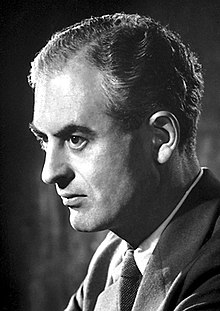Peter Medawar
Sir Peter Brian Medawar (born February 28, 1915 in Petrópolis in the state of Rio de Janeiro , Brazil , † October 2, 1987 in London , England ) was an English zoologist and the founder of transplant immunology . In 1960 he and Macfarlane Burnet received the Nobel Prize in Physiology or Medicine "for their discovery of acquired immunological tolerance". Medawar was of the opinion that his former student Leslie Baruch Brent , a Jew from Köslin who was able to get to Great Britain on a Kindertransport in 1938, had also deserved the award and sent him part of the prize money.
Live and act
Medawar, the son of a Lebanon-born Brazilian businessman and an Englishwoman, taught at Marlborough College from 1928 to 1932 , then studied zoology at Magdalen College , Oxford . In 1935 he received his Ph. D. During World War II he worked for the Medical Research Council . In the early 1940s, he began to deal with the subject of the immune system and transplants . In 1943 he published a fundamental work in this area with Thomas Gibson, The fate of skin homografts in man . In this publication, both demonstrated that organ rejection from donors not related to the recipient is based on immunological principles . In 1948 he first described the immunity privilege . 1952 developed Medawar with the mutation accumulation theory ( Engl. Mutation accumulation theory ) one on the theory of evolution based hypothesis to explain the causes of the aging of higher species .
From 1947 to 1951 Medawar was professor of zoology at the University of Birmingham , from 1951 to 1962 at the University of London . In 1962 he became director of the National Institute for Medical Research .
In 1959 Medawar was awarded the Royal Medal by the Royal Society . Also in 1959 he was elected to the American Academy of Arts and Sciences , 1961 to the American Philosophical Society , 1965 to the National Academy of Sciences and 1966 to the Royal Society of Edinburgh . In 1981 he became an honorary member of the British Academy . In 1965 he was knighted as a Knight Bachelor and in 1985 he was awarded the Kalinga Prize for the popularization of science.
Works
- The uniqueness of the individual. Suhrkamp, Frankfurt am Main 1969
- The art of the solvable. Reflections of a biologist. Vandenhoeck and Ruprecht, Göttingen 1972, ISBN 3-525-33326-9
- The future of man. The British Broadcasting Corporation's Reith Lectures. S. Fischer, Frankfurt am Main 1967
- Advice to a Young Scientist. Piper, Munich, Zurich 1984, ISBN 3-492-02867-5
- From Aristotle to Chance. A philosophical lexicon of biology. Piper, Munich, Zurich 1986, ISBN 3-492-02901-9
literature
- Gerald Neitzke: Medawar, Peter Brian. In: Werner E. Gerabek , Bernhard D. Haage, Gundolf Keil , Wolfgang Wegner (eds.): Enzyklopädie Medizingeschichte. De Gruyter, Berlin / New York 2005, ISBN 3-11-015714-4 , pp. 901 f.
Web links
- Literature by and about Peter Medawar in the catalog of the German National Library
- Information from the Nobel Foundation on the 1960 award to Peter Brian Medawar
Individual evidence
- ↑ Leslie Baruch Brent: Fled from Germany 75 years ago
- ↑ Leslie Baruch Brent - The Story of a German Jew
- ↑ Gerald Neitzke: Medawar, Peter Brian. 2005, p. 901.
- ^ T. Gibson, PB Medawar: The fate of skin homografts in man. In: Journal of anatomy. Volume 77, July 1943, pp. 299-310, PMID 17104936 , PMC 1252734 (free full text).
- ↑ Peter B. Medawar: Immunity to homologous grafted skin; the fate of skin homografts transplanted to the brain, to subcutaneous tissue, and to the anterior chamber of the eye. In: British journal of experimental pathology. Volume 29, Number 1, February 1948, pp. 58-69, PMID 18865105 , PMC 2073079 (free full text).
- ^ PB Medawar: An Unsolved Problem of Biology. In: Uniqueness of the Individual. HK Lewis, London, 1952, pp. 44-70.
- ^ EB Edney and RW Gill: Evolution of senescence and specific longevity. In: Nature 220, 1968, pp. 281-282. PMID 5684860
- ^ Member History: Peter B. Medawar. American Philosophical Society, accessed November 24, 2018 .
- ^ Fellows Directory. Biographical Index: Former RSE Fellows 1783–2002. (PDF file) Royal Society of Edinburgh, accessed March 20, 2020 .
- ^ Deceased Fellows. British Academy, accessed July 7, 2020 .
| personal data | |
|---|---|
| SURNAME | Medawar, Peter |
| ALTERNATIVE NAMES | Medawar, Peter Brian |
| BRIEF DESCRIPTION | English anatomist |
| DATE OF BIRTH | February 28, 1915 |
| PLACE OF BIRTH | Petrópolis , Brazil |
| DATE OF DEATH | 2nd October 1987 |
| Place of death | London , England |
